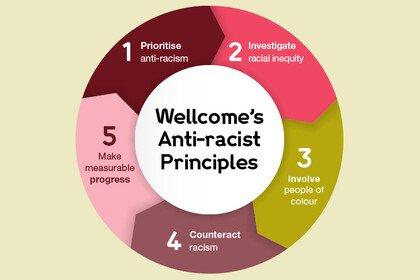
An update on Wellcome’s anti-racism programme
Since publishing this article we have announced further detail on how we will use positive action in shortlisting for our open funding calls and schemes. Read the latest information.
Two years ago, Wellcome made a statement recognising that we have perpetuated racism, and made a commitment to becoming an anti-racist organisation. We committed to developing anti-racist principles and an anti-racist programme, and to an external evaluation of our progress.
This evaluation of our work to become an anti-racist funder and employer has now reported. It has found that Wellcome is still an institutionally racist organisation, and that we have yet to act on this with the urgency required. I am sharing this report [PDF 1.65MB] with you today. Wellcome Collection, and our investments team and portfolio, were not in scope.
Download the full anti-racism evaluation report [PDF 1.65MB] or listen to the audio version below.
Acknowledgements: 2m 15s
Abbreviations: 3m 15s
Executive Summary: 5m 10s
1. Introduction: 8m 19s
2. Wellcome as an Inclusive Employer: 15m 18s
3. Wellcome as an Inclusive Funder & Inclusive Research: 1hr 37m 0s
4. Our Assessment: 2h 59m 53s
5. Recommendations: 3h 19m 06s
6. Conclusion: 3h 32m 19s
Annex One: 3h 34m 44s
Methodology: 3h 34m 44s
Data sources: 4h 5m 21s
Annex Two: Case Studies: 4h 12m 57s
Inclusive Employer: A: Mental Health team, Wellcome: 4h 12m 57s
Inclusive Funder & Researcher: B: Data for Science and Health team, Research programmes, Wellcome: 4h 19m 28s
Annex Three: Documents shared by Wellcome: 4h 35m 1s
While the evaluation found some progress, such as improvements in the racial diversity of our workforce and some positive behavioural and practice shifts, it reached a clear conclusion that we continue to fall short of our commitment to anti-racism, both as a funder and as an employer.
As Director of Wellcome, I accept this. I apologise for the actions and inactions that have caused this, and for the pain and disappointment it has led to.
The evaluation includes some descriptions of unacceptable racist behaviours, and reading about these may be hurtful to those who have experienced them. This lived experience provides insights that will advance and enhance our anti-racism work.
I am grateful for the feedback that our grant-holders, our staff and our advisers have given us through this evaluation, and in our broader anti-racism work, especially given the emotional burden involved in providing it.
Today, I am announcing further actions to advance anti-racism, which speak to our determination to do better.
As a charitable foundation that will spend at least £16 billion over the next decade on science to solve the urgent health challenges facing everyone, we know that Wellcome has great power. We have done too little to use this power to counter racial inequity in research.
Our next actions in addressing inequity in our research funding will be to introduce two measures in the next year:
-
A set of positive action principles applied to funding decision-making processes. These will ensure that when applications are similar in merit, we favour those which add to the diversity of the pool of people we support. We believe that a consistent and transparent approach to this will be important both to fairness and equity, and to encouraging a more diverse group of people to apply for our funding. We will be exploring how best to achieve this.
-
A dedicated stream of funding available exclusively to researchers who are Black and people of colour, targeted at the career stages where this will have the greatest benefits for diversity.
We will be announcing more detail about each of these measures over the coming months, as we develop the mechanisms by which they will be implemented. If there are to be any changes to our application processes, we will advise grant seekers in advance.
We will also be setting clear expectations that the institutions we fund should take action to increase the numbers of people of colour embarking on and remaining in research careers. We know that we already work with many of you, and your institutions, on equity, diversity and inclusion (EDI) and antiracism and we want those positive and constructive relationships to continue.
We are also announcing today that Wellcome will appoint a new member of the Executive Leadership Team (ELT), reporting to the Director, with responsibility for leading Wellcome’s equity, diversity and inclusion work, including our specific focus on anti-racism. The role will help us to fully embed inclusive practices across the organisation and its work. It does not alter the responsibility of each ELT member to act on anti-racism and EDI more broadly: rather, a key purpose of the role is to support them, challenge them, and hold them to account, as a peer with specialist expertise and experience. As our strategic ambitions have developed over the year, it has become clear to me that we will not be successful in delivering them without this additional emphasis.
We have already made some important changes to governance and accountability for the anti-racism initiatives, through an equity, diversity and inclusion committee with a direct reporting line to the Board. This will build on our Diversity, Equity and Inclusion strategy, published in 2021, which sets out our goals for becoming a more inclusive employer and funder.
Other actions include a programme to educate ourselves about the nature and impact of racist micro-aggressions, and equipping ourselves to challenge them, so that we can create the truly zero tolerance approach to racism we have long professed but have failed fully to implement. The term ‘microaggressions’ is misleading, as these acts are not minor and their impact is often devastating. I use the term here as it is used in the report.
Our work on anti-racism is core to who we are, and to the way we deliver our mission. We must reflect it in our behaviour, in our processes, and across all our work. We want everyone working at, and funded by, Wellcome to be treated equitably so they can thrive, progress and flourish as we work together to reach our mission.
If you need to speak to someone in relation to this news, you can contact us here: research.update@wellcome.org or via your usual contact.

